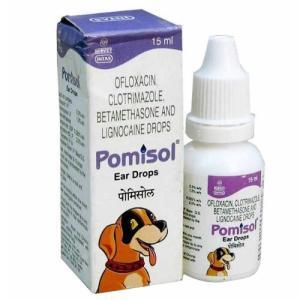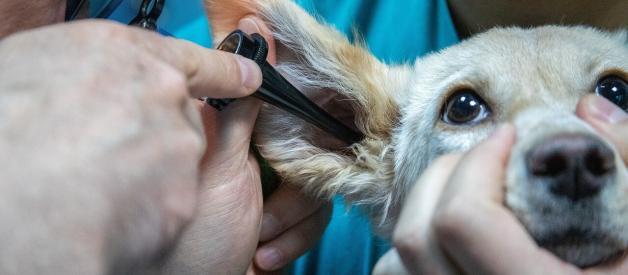Table of Contents
Caring for your dog’s ears is vital because it prevents painful infections, maintains their comfort, preserves their hearing, avoids costly vet bills, and prevents complications from arising.

What Are Pomisol Ear Drops?
Pomisol Eardrops, containing Ofloxacin, Clotrimazole, Beclomethasone Dipropionate, and Lignocaine, is a versatile antibiotic used to address fungal infections in the ear. These eardrops effectively remove excess moisture from the ear canal, alleviating severe ear discomfort and pain. Pomisol Ear Drops offer a comprehensive topical solution for managing mixed ear infections.
Ingredients
Ofloxacin: Ofloxacin is a broad-spectrum antibiotic used to treat various bacterial infections. In ear drops like Pomisol, it helps combat bacterial infections commonly found in the ear canal. Ofloxacin works by inhibiting the growth and multiplication of bacteria, making it effective against a wide range of bacterial strains.
Clotrimazole: Clotrimazole is an antifungal medication used to treat fungal infections. In Pomisol ear drops it targets fungal infections within the ear. Clotrimazole disrupts the fungi’s cell membranes, preventing them from growing and spreading. It is particularly effective against yeast and other fungal organisms commonly associated with ear infections.
Betamethasone: Betamethasone is a corticosteroid that helps reduce inflammation and itching. In Pomisol ear drops it serves to relieve the inflammation and discomfort caused by various ear infections. By suppressing the immune response in the affected area, betamethasone alleviates symptoms and enhances the overall effectiveness of the medication.
Lignocaine (Lidocaine): Lignocaine, also known as lidocaine, is a local anesthetic that relieves pain. In Pomisol ear drops, it plays a crucial role in easing the discomfort and pain associated with ear infections. Lignocaine works by blocking nerve signals in the affected area, temporarily numbing it, and providing rapid relief from pain and irritation. This ingredient enhances the overall comfort of the treatment process.
How to Use
Using Pomisol ear drops in dogs should be done with care.
Preparation: Start by thoroughly washing your hands to ensure they are clean and contaminant-free. Have the Pomisol ear drops, a clean towel or tissue, and some treats ready.
Application: Depending on your dog’s temperament and size, you may need someone to help hold your dog still during the process. Gently but firmly secure your dog in a comfortable position. Carefully inspect the affected ear for any visible debris, redness, swelling, or signs of infection. If you notice any abnormalities or if your dog appears in severe pain, consult your veterinarian before using the ear drops.
Administer the Drops: Hold the ear flap upright and gently lift it to straighten the ear canal. Hold the Pomisol ear drops in your hand and warm them to room temperature if they are cold. Cold drops can cause discomfort. Administer the prescribed number of drops (as directed by your veterinarian) into the ear canal. Be sure to follow the dosage instructions precisely. Gently massage the base of the ear for about 20-30 seconds. This helps distribute the medication within the ear. Your dog will likely want to shake their head after administering the drops. This is normal and helps distribute the medication further within the ear. Be prepared for some ear drops to come out during this process.
Post-Treatment: Use a clean towel or tissue to gently wipe away any excess medication that may have come out of the ear. Reward your dog with treats and praise to make the experience more positive.
Follow your veterinarian’s instructions regarding the frequency and duration of treatment. It’s essential to complete the entire course of treatment, even if your dog’s symptoms improve.
Remember to be gentle and patient when administering ear drops to your dog, and if you encounter any difficulties or if your dog’s condition worsens, consult your veterinarian for further guidance.
Important Safety Information for Pet Owners
Pet owners should be aware of some general safety information when using Pomisol ear drops or any medication for their pets.
Always consult your veterinarian before using Pomisol or any medication on your pet. They will assess your pet’s condition and prescribe the appropriate treatment. Administer the prescribed dosage of Pomisol as directed by your veterinarian. Do not exceed or skip doses, as this can lead to ineffective treatment or adverse effects. Apply the ear drops exactly as instructed, whether in one or both ears. Avoid touching the dropper to the ear to prevent contamination.
If your veterinarian recommends cleaning your pet’s ears before applying Pomisol, use a gentle, pet-safe ear cleaner. Be cautious not to push debris further into the ear canal.
Keep an eye on your pet for adverse reactions, such as increased redness, swelling, itching, or discomfort after using the medication. If you notice any concerning signs, contact your veterinarian promptly.
Monitor your pet’s progress during the treatment period. If there is no improvement or if the condition worsens, consult your veterinarian for further evaluation.
Finish the full course of treatment, even if your pet’s symptoms improve before the medication is finished. Prematurely discontinuing treatment can allow the infection to return.
Ensure that the dropper and bottle tip do not come into contact with any surfaces, including your pet’s ear, to prevent contamination.
If your pet is pregnant, nursing, or has any underlying medical conditions, inform your veterinarian, as this may affect the treatment choice. If your pet has a known allergy to any of the ingredients in Pomisol, inform your veterinarian immediately.
Maintain a record of when and how you administer the medication to ensure accurate dosing.
Veterinary Prescription
Pomisol ear drops are available only with a prescription from a licensed veterinarian. These ear drops contain several active ingredients, including antibiotics, antifungals, and corticosteroids, which should be used under veterinary guidance to ensure their safe and effective use.
To purchase Pomisol ear drops, you would need a prescription from your veterinarian after examining your pet and determining that this medication is appropriate for your pet’s specific condition.
Please note that regulations regarding the sale of veterinary medications may vary by location. Therefore, we recommend contacting your veterinarian, local pharmacy, or pet supply store for the most up-to-date information on the availability and prescription requirements for Pomisol ear drops in your area.

Interactions
Pomisol ear drops contain multiple active ingredients, including antibiotics, antifungal agents, corticosteroids, and a local anesthetic. While these ingredients are generally safe when used as directed, they can interact with other medications or conditions. Here are some potential interactions to be aware of:
- Other Ear Medications: Using multiple ear medications simultaneously may lead to interactions or reduced effectiveness. Always consult your veterinarian before combining ear drops with other treatments.
- Medications That Affect Blood Clotting: Be cautious when using Pomisol if your pet is also taking medications that affect blood clotting, as corticosteroids like betamethasone can potentially increase the risk of bleeding.
- Other Corticosteroids: Using other corticosteroid medications in conjunction with Pomisol may increase the risk of side effects associated with corticosteroids, such as immune suppression or gastrointestinal issues.
- Other Medications: Inform your veterinarian of other medications your pet takes, including over-the-counter drugs, supplements, or herbal remedies. Some medications may interact with the active ingredients in Pomisol.
- Underlying Health Conditions: If your pet has certain health conditions, such as diabetes, heart disease, or a compromised immune system, using Pomisol may require additional monitoring or adjustments in treatment.
- Allergies: Be sure to inform your veterinarian of any known pet allergies related to medications or other substances.
- Pregnancy and Nursing: If your pet is pregnant or nursing, discuss the use of Pomisol with your veterinarian, as there may be considerations regarding its safety for the mother and developing offspring.
- Other Ear Conditions: If your pet has a history of chronic ear issues or recurrent infections, it’s essential to work closely with your veterinarian to determine the best treatment plan, as extended or repeated use of ear drops may have specific considerations.
To ensure the safety and effectiveness of Pomisol ear drops for your pet, follow your veterinarian’s instructions carefully and inform them of your pet’s medical history and any other medications or treatments your pet is receiving.
Side Effects
Pomisol ear drops, like many medications, may have potential side effects. These side effects can vary in severity and may not occur in every pet. It’s essential to use Pomisol under the guidance of a veterinarian, who can monitor your pet’s response to the medication and address any side effects promptly. Here are some potential side effects associated with Pomisol ear drops:
- Local Irritation: Mild irritation or burning sensation in the ear after application is possible. This is typically temporary and should subside on its own.
- Allergic Reactions: In rare cases, pets may experience an allergic reaction to one or more of the ingredients in Pomisol. Signs of an allergic reaction can include swelling, itching, hives, difficulty breathing, or a rash. Seek immediate veterinary attention if you suspect an allergic reaction.
- Increased Ear Discharge: After using ear drops, you may notice an increase in ear discharge. This can be part of the normal process of clearing the ear of debris and medication.
- Hearing Changes: In rare cases, especially with prolonged use, there may be temporary changes in hearing. This is a result of the local anesthetic (lignocaine) in Pomisol. If you notice any hearing changes in your pet, contact your veterinarian.
- Secondary Infections: Prolonged or inappropriate use of ear drops can sometimes lead to secondary infections or the development of resistant organisms. Always follow your veterinarian’s instructions regarding dosage and duration of treatment.
- Systemic Effects: The corticosteroid (betamethasone) in Pomisol can potentially have systemic effects, especially if used excessively or over an extended period. These effects may include increased thirst and urination, changes in appetite, and weight gain. Prolonged use of corticosteroids can have more serious systemic effects and should be closely monitored by a veterinarian.
- Masking Underlying Conditions: While corticosteroids can help manage inflammation, they can also mask symptoms of underlying conditions, such as ear mites or more severe infections. This underscores the importance of a thorough veterinary examination and diagnosis.
It’s crucial to promptly report any adverse effects or unusual symptoms to your veterinarian. Your veterinarian can help assess whether the benefits of using Pomisol outweigh any potential risks and can adjust the treatment plan as needed.
Overdose
Overdosing on Pomisol ear drops can lead to adverse effects, and using this medication as your veterinarian prescribes is essential. If you suspect your pet has received an overdose of Pomisol ear drops, here are some steps to take.
The first and most crucial step is to contact your veterinarian immediately. They can guide you on what to do next based on your pet’s specific situation. Be prepared to provide information on the amount of medication your pet ingested and any observed symptoms.
While waiting for guidance from your veterinarian, closely monitor your pet for any signs of distress or adverse reactions. Overdose symptoms can vary but may include increased irritation or discomfort in the ear, excessive drooling, lethargy, vomiting, diarrhea, or other unusual behavior.
Do not attempt to induce vomiting in your pet unless specifically instructed to do so by your veterinarian. Some substances can cause further harm if vomiting is induced.
Keep any remaining Pomisol ear drops or related materials out of your pet’s reach to prevent further exposure or ingestion.
If your veterinarian advises it or if your pet’s condition worsens rapidly, seek emergency veterinary care immediately. Be sure to inform the emergency veterinarian about the overdose and any guidance you received from your regular veterinarian.
It’s crucial to act promptly if you suspect an overdose, as early intervention can help minimize potential harm to your pet.
Storage
Store Pomisol ear drops in a cool, dry place. Avoid exposing them to extreme temperatures, such as direct sunlight or excessive heat, as this can degrade the medication. Ensure that the bottle is tightly sealed when not in use. This helps prevent contamination and evaporation of the medication.
Some ear medications may benefit from refrigeration. Check the label or consult your veterinarian to determine if Pomisol ear drops should be stored in the refrigerator. If refrigeration is recommended, store the medication in a designated area within the refrigerator to prevent cross-contamination with food.
Keep Pomisol ear drops out of reach of children and pets. The medication should be stored in a location inaccessible to curious animals or young family members.
Do not touch the dropper tip or allow it to come into contact with any surfaces, including the inside of your pet’s ear, as this can introduce contaminants.
Always check the expiration date on the medication label before use. Do not use Pomisol ear drops if they are past their expiration date.
If you have expired Pomisol ear drops, dispose of them properly. Do not flush medications down the toilet or drain; they can harm the environment. Consult your local pharmacy or municipal guidelines for medication disposal recommendations.
FAQ
What are Pomisol ear drops used for?
Pomisol ear drops treat various ear conditions in dogs, including bacterial and fungal ear infections.
Can I use Pomisol ear drops on cats or other pets?
Pomisol is specifically formulated for dogs and should not be used on cats or other animals unless directed by a veterinarian.
Can I clean my dog’s ears before using Pomisol ear drops?
Consult your veterinarian for guidance on ear cleaning. In some cases, they may recommend gentle ear cleaning before using Pomisol.
What should I do if I miss a dose of Pomisol ear drops?
Refrain from doubling the dose to make up for a missed one, as this can lead to overuse or adverse effects.

































